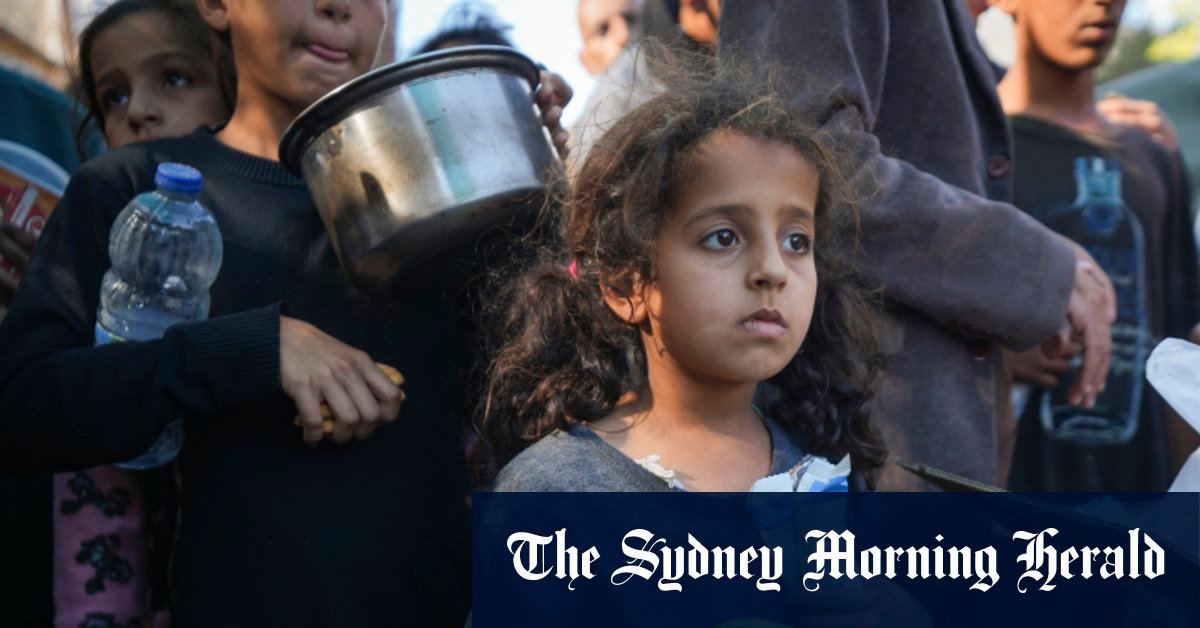By Nidal al-Mughrabi
Cairo: Hamas’ acting Gaza chief Khalil al-Hayya says that there will be no hostage-for-prisoner swap deal with Israel unless the war in the Palestinian enclave ends.
“Without an end to the war, there can be no prisoner swap,” Hayya said in a televised interview with the group’s Al-Aqsa channel.
“If the aggression is not ended, why would the resistance and in particular Hamas, return the prisoners [hostages]?” he said. “How would a sane or an insane person lose a strong card he owns while the war is continuing?”

A Palestinian girl queues for food in Deir al-Balah, Gaza Strip, on Monday.Credit: AP
Efforts to negotiate a truce for Gaza have stalled, and overnight the US vetoed a UN Security Council resolution calling for an unconditional permanent ceasefire. Washington’s UN ambassador said the US would only support a resolution that explicitly called for the immediate release of the Israeli hostages as part of a ceasefire.
Hayya, who led Hamas’ negotiating team in talks with Qatari and Egyptian mediators, blamed the lack of progress on Israeli Prime Minister Benjamin Netanyahu, who in turn holds the Islamist group responsible for the stalled talks.
“There are contacts under way with some countries and mediators to revive this file [negotiation]. We are ready to continue with those efforts, but it is more important to see a real will on the side of the occupation to end the aggression,” said Hayya.
“The reality proves that Netanyahu is the one who undermines [negotiations],” he added.
During a visit to Gaza on Tuesday, Netanyahu reiterated Israel’s position that Hamas would not rule the Palestinian enclave after the war ended. He said Israel had destroyed the Islamist group’s military capabilities.
Hamas welcomes Egypt’s Gaza post-war proposal
Netanyahu also said Israel had not given up trying to locate the 101 remaining hostages believed to still be in the enclave, and he offered a $US5 million ($7.6 million) reward for the return of each one.
Hamas wants a deal that ends the war and releases Israeli and foreign hostages held captive in Gaza, as well as Palestinians jailed in Israel, while Netanyahu vows the war can only end once Hamas is eradicated.

Prime Minister Benjamin Netanyahu, centre, surrounded by ministers from the government attends a session of the Knesset, Israel’s parliament, in Jerusalem, on Monday.Credit: AP
Qatar, a key ceasefire mediator alongside Egypt, said it had informed Hamas and Israel that it would stall its mediation efforts unless the two warring parties showed “willingness and seriousness” to reach a deal.
On November 19, Qatari Foreign Ministry spokesperson Majed al-Ansari said the political office of Hamas in Doha had not been permanently closed.
Earlier this month, Reuters quoted a US official saying Washington had asked Qatar to expel the group and that Doha had passed this message on to Hamas.
Ansari said the Hamas office had been created to facilitate mediation efforts to end the Gaza war.
Hayya said Hamas had welcomed an Egyptian proposal for Hamas to form an administrative committee with the rival Fatah movement of West Bank-based President Mahmoud Abbas to run the Gaza Strip, a move that addresses the outstanding question of how the enclave will be run when the fighting stops.
But an agreement has yet to be finalised, Hayya said. Israel rejects any Hamas role in governing Gaza after the war and it does not trust Abbas’ Palestinian Authority to take over running the enclave.
The October 7, 2023, attack on Israel, which shattered its aura of invincibility, marked the country’s bloodiest day – 1139 people were killed, according to a revised Israeli tally, and some 250 taken hostage.
Israel responded with its most destructive offensive in Gaza, killing nearly 44,000 people and wounding 103,898 so far, according to the Gaza Health Ministry, and turning the enclave into a wasteland of rubble with millions desperate for food, fuel, water and sanitation.
Israeli strikes and combat to eliminate Hamas-supporter Hezbollah in Lebanon have killed more than 3500 people and wounded 15,000, according to the Lebanese Health Ministry. On the Israeli side, 87 soldiers and 50 civilians have been killed.

Lebanese Army Intelligence members inspect an army position that was damaged in an Israeli airstrike on Tuesday night, in Sarafand, southern Lebanon.Credit: AP
Meanwhile, Israel bombed at least five crowded homes in northern Gaza early on Thursday, health officials said.
Hamas media put the number of fatalities at 57, but there was no official figure immediately from the Gaza Health Ministry. Rescue operations were under way as many people remained missing or trapped under the rubble, medics said.
Medics said the incidents included attacks on houses and a school sheltering displaced people in central Gaza, bombing of a hospital in northern Gaza and airstrikes on the humanitarian-designated area of Al-Mawasi and Rafah in the south. Palestinian and UN officials say no place in the enclave is safe.
And an Israeli airstrike on the Syrian town of Palmyra, known for the historic Roman temple complex nearby, killed 36 people and wounded more than 50 overnight, the Syrian state-run news agency said.

Roman and other ruins at Palmyra, Syria. On the left is the Temple of Baal Shamin, which was destroyed by Islamic State in 2015.Credit: Getty Images
SANA said the strikes also led to “significant material damage to the targeted buildings and the surrounding area”. It was not immediately clear if the ruins were damaged. The death toll from strike was unusually high.
The Israeli military declined to comment. Israel frequently targets military sites and facilities associated with Iran-linked groups in Syria but rarely acknowledges the strikes.
Most Viewed in World
Loading
